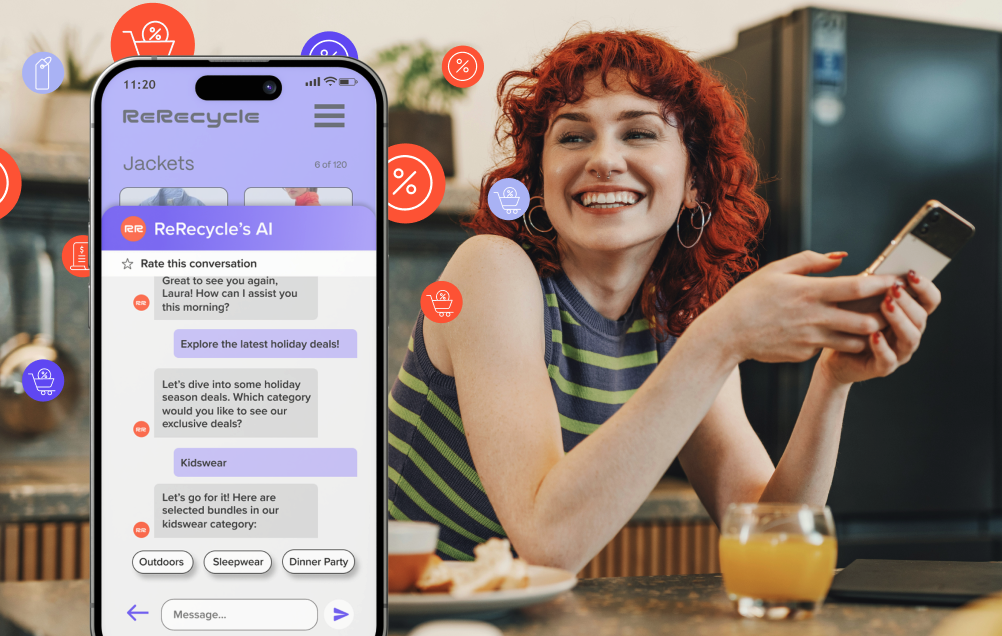5 Powerful Benefits of AI for E-Commerce
Artificial intelligence (AI) is becoming an increasingly common part of online stores.
Ever received an email with product recommendations highly personalized to your interests? Or maybe you’ve had a two-minute conversation with a chatbot to find a pair of trousers in your size? If the answer is yes, you’ve experienced AI in e-commerce.
Today, powerful technology like AI & machine learning is popping up throughout the shopping journey, from product recommendations and online sales assistants to voice searches and hyper-targeted remarketing – and it’s set to get more prevalent. In fact, Gartner’s latest report states that the number of businesses using AI has increased by 270% over the past five years, and it’s not about to slow down any time soon.
With a surge of brick-and-mortar stores wanting to make waves in the e-commerce arena, AI for e-commerce is now more important than ever for boosting engagement, creating slick customer experiences, and increasing customer satisfaction and sales.
Here’s how online merchants are benefitting from AI for e-commerce.
1. Personalized Product Recommendations
Consumers crave personalization. In fact, 66% of customers expect brands to understand their unique needs. They don’t want to have to dig deep to find what they’re looking for – they want it to be handed to them on a plate. But creating personalized experiences for each and every customer is impossible to do manually. This is where AI comes into play.
AI virtual assistants are able to learn about customers through their behavior on your site and the information they give you to serve them highly personalized product recommendations that increase sales, trust, and loyalty.
Brands are using tools like quizzes where customers can share style data, tracking Pixels to identify similar products a shopper is interested in, and granular data that highlights which pages someone has visited and what actions they’ve taken on your website so they can serve accurate product recommendations.

Zee&Co tracks visitors on its website and sends product recommendation emails based on the items they showed interest in.
In a similar way, Herbaly offers product recommendations using information shoppers give its on-site AI-powered chatbot.

When a customer clicks on the benefit they’re looking for, the chatbot redirects them to a product page that is relevant to their needs.
2. Enhanced Customer Service
In a traditional brick-and-mortar business model, customers enter a store and are greeted by a sales associate who can answer their questions and guide them towards products that meet customer demand.
This is a difficult concept to transfer online because it relies on having a human touch – a.k.a. someone who knows about the business and its products and who can recommend relevant products, answer questions, and help shoppers find what they’re looking for.
AI chatbots or sales associates are bridging the gap between the offline shopping experience and the e-commerce world. They are able to answer in-the-moment questions about products, shipping, and orders, as well as serve relevant product recommendations and help shoppers find the content and information they need to make purchasing decisions.

Ritual Proof Zero’s chatbot directs shoppers toward relevant content, answers their questions about product ingredients, and helps them with their orders. It has led to a 5x lift in on-site conversion rates due to the enhanced personalized shopping experience.
3. Targeted Marketing and Powerful Segmentation
Competition is fierce, and e-commerce brands are having to hone their marketing efforts to reach the right people with the right message at the right time. It can be tricky to get right.
Luckily, AI technology has made it easier than ever to hyper-segment audiences based on psychographic and demographic information like their biggest challenges, their lifestyle, and their past browsing behavior.
This information is stored and updated, and it can be used to target ad campaigns and marketing efforts across multiple channels. Even better, AI can intelligently predict which channels individual customers are most likely to use and serve them ads or content in a more native, engaging way. It can also deliver well-timed messages on autopilot. For example, if someone has left an item in their cart, AI can identify that and send an email or a text message reminding the shopper to go to the checkout.

Color Wow segments its VIPs and sends them exclusive offers, discounts, and early access to the latest products.
4. Increased Loyalty and Retention
Returning customers are more profitable than new ones, a prime example of the benefits of AI in ecommerce. They tend to spend more and act as your most effective marketers by telling their friends, family, and followers about your products.
As well as serving personalized product recommendations that get increasingly accurate the more a customer shops with you, AI can analyze purchase history to predict consumer trends and learn more about each shopper. As a result, you’re able to automatically deliver unique experiences for each individual customer based on their preferred channels and interaction with you.
Chatbots also come into play in customer retention. AI-powered sales associates can automate answers to routine questions and give existing customers instant information about their orders. This eliminates any friction they might have about making another purchase and creates delightful experiences that keep them coming back for more.

ILIA identifies customers who might be running out of a product they purchased and sends a reminder email encouraging them to buy more.
5. Automated Customer Journeys
No two customers are the same and, with each individual demanding a personalized experience unique to their own wants and needs, it’s a struggle for e-commerce brands to deliver. AI takes all the data you have available on your customers or target audience and uses it to predict their next move, whether that’s adding an item to their cart, contacting support, or sharing a review.
The more AI technology learns about each customer, the more accurate it becomes in predicting what they want and when they want it, contributing to increased customer loyalty. It can then automate each action or touchpoint so that it aligns with the shopper’s needs – for example, it might trigger an informative email about product use cases to a customer who has looked at the same item several times but hasn’t added it to their cart, or it might send a well-timed replenishment SMS to a customer who regularly buys the same product.

GUESS uses AI to learn more about its customers. It can then use that information to create unique, personalized journeys for each and every shopper.
AI for Ecommerce: Ready to Get Started?
AI for ecommerce is pretty much mandatory in today’s e-commerce landscape. Fierce competition and high customer expectations mean brands are tasked with creating personalized experiences that delight shoppers over and over again.
Our AI-powered Rep sales associates ensure customers have seamless shopping journeys whenever they visit your site. The bots learn about each shopper so they can welcome existing customers back and introduce themselves to new ones. Even better, you can teach the sales associates how to answer common questions, deliver important order information, and detect shoppers who have been distracted so they can re-engage them with relevant content and accurate product recommendations.
Ready to get started? Book a do today.
Quick Answers and FAQs
What is natural language processing and how does it benefit e-commerce?
Natural language processing (NLP) is a branch of AI that enables computers to comprehend and generate human language, enhancing e-commerce. By refining search capabilities, NLP ensures customers quickly find what they seek through understanding natural language queries and providing precise results.
It also bolsters customer service with chatbots handling inquiries instantly, allowing human agents to focus on complex tasks. NLP analyzes customer behavior to offer tailored product recommendations and marketing messages, boosting conversion rates and loyalty.
How does AI help optimize inventory levels in an e-commerce business?
AI in e-commerce is reshaping inventory management by offering precise demand forecasting through historical sales, customer behavior, and market trends analysis. This capability ensures optimal stock levels, reducing overstock and stockouts. With real-time inventory tracking,
AI automates reorder processes and integrates with suppliers, enhancing supply chain efficiency. Additionally, AI segments products based on sales patterns and demand variability, allowing merchants to allocate resources strategically.
How does AI leverage historical sales data to improve e-commerce performance?
AI uses historical sales data to enhance e-commerce performance by predicting demand, optimizing inventory, and personalizing customer experiences. This approach allows businesses to fine-tune their supply chains, tailor marketing efforts, and implement dynamic pricing strategies that boost sales and customer satisfaction. With AI, merchants can segment audiences more precisely and engage them with timely, relevant content.
How can AI help identify and engage potential customers in e-commerce?
AI is revolutionizing e-commerce by identifying and engaging potential customers through personalized interactions and data-driven insights. It analyzes customer behavior and preferences to offer tailored product recommendations and create targeted marketing campaigns. With AI, e-commerce businesses can enhance customer service, automate routine inquiries, and deliver personalized experiences, crucial for retaining customers and increasing sales.
How does AI impact job roles within the ecommerce industry?
Artificial intelligence is reshaping ecommerce job roles by automating routine tasks like customer service, inventory management, and personalized recommendations. This allows employees to focus on strategic and creative tasks that require a human touch.
As AI becomes ingrained in ecommerce, new roles like AI/ML engineers, data scientists, and AI strategy managers are emerging, driving demand for specialized skills.
Traditional roles are evolving; web developers, marketers, and UX/UI designers now use AI tools to optimize their work. To stay competitive, professionals need to upskill in AI literacy and strategic thinking.
What types of repetitive tasks can AI automate for online retailers?
AI can automate repetitive tasks for online retailers, enhancing efficiency and customer satisfaction. From automating order processing and payment confirmations to managing inventory updates, AI ensures smooth operations.
AI chatbots provide instant customer support, answering common queries and facilitating self-service. Marketing efforts are refined through personalized product recommendations and targeted campaigns driven by customer data.
Rep AI, your always-on AI concierge, offers solutions to maximize interactions and streamline your Shopify store operations.
How does AI help in detecting and preventing fraudulent activities in e-commerce?
AI safeguards e-commerce platforms by monitoring transactions in real-time and identifying suspicious activities early. It uses machine learning to analyze data, recognizing patterns indicating fraud, while refining its accuracy.
Through behavioral analysis, AI detects anomalies in spending habits and device usage, enhancing security with biometric verification and behavioral biometrics. These methods improve accuracy, save costs, and boost customer confidence in online shopping.
How does AI technology integrate into an e-commerce marketing strategy?
AI technology integrates into e-commerce marketing by offering personalization and automation. It analyzes customer data to deliver tailored product recommendations, customize website content, and target ads based on behavior and preferences.
AI automation streamlines tasks like email marketing and social media management, freeing up time for strategic initiatives. AI chatbots improve customer service, providing instant support and enhancing satisfaction.
For merchants looking to maximize visitor potential, Rep AI offers a cutting-edge solution, redefining engagement through intelligent, always-on AI concierges.
What types of e-commerce marketing campaigns benefit the most from AI integration?
AI is revolutionizing e-commerce marketing by offering tailored experiences and automating processes. It excels in personalized product recommendations, analyzing customer data to boost engagement, sales, and loyalty. By optimizing pricing and segmenting audiences, AI drives effective ad campaigns across channels. Automated email marketing and AI chatbots enhance customer interaction and service, ensuring a seamless shopping experience.


.png)










